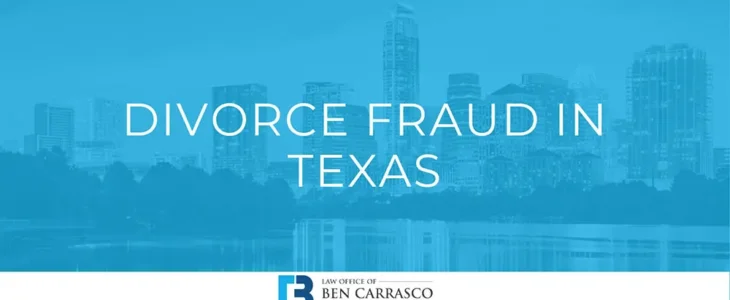Divorce fraud typically arises during a divorce when a court is determining the distribution of the community estate. In Texas, the community estate includes all marital assets.
Usually, the marital assets are split equally between the former spouses during a divorce. However, the community estate can be split unevenly if one spouse committed fraud during the marriage or divorce.
The harmed spouse may also be awarded a monetary judgment if the fraud was severe and there are not enough assets in the community estate to compensate that spouse.
If you believe your former spouse committed fraud during your marriage or divorce, you should contact an Austin divorce attorney today.
Actual Versus Constructive Fraud
There are two types of fraud in divorce cases: actual and constructive. Both types of divorce fraud involve a wrong committed by one spouse that justifies an unequal distribution of the community estate.
ACTUAL FRAUD
Actual fraud occurs when one spouse acts dishonestly with the intent to deceive the other spouse. This act of dishonesty prevents the other spouse from the use and enjoyment of his or her property. Typically, a third party such as a new significant other or relative helps carry out the fraud.
Succeeding on an actual fraud claim can be difficult because you must prove that one spouse either had the intent to deceive the other spouse or acted dishonestly. Contacting an Austin divorce lawyer can make it more likely that you will succeed on an actual fraud claim.
CONSTRUCTIVE FRAUD
There are two related forms of constructive fraud: (1) waste of assets and (2) breach of fiduciary duty.
Generally, each spouse has a legal obligation to act in the best interests of the other spouse. Additionally, both spouses owe a fiduciary duty to each other not to waste marital assets.
A spouse wastes marital assets when he or she disposes of marital property without the other spouse’s consent so that they cannot get their fair share of it.
There is a presumption of fraud when one spouse terminates the other’s interest in marital property without that spouse’s consent or knowledge.
For example, a presumption of fraud exists when a husband sells stock that he and his wife bought together during their marriage and keeps the proceeds for himself.
Furthermore, constructive fraud does not require proof that your former spouse acted with the intent to deceive you. As a result, you are more likely to be successful on a constructive fraud claim than on an actual fraud claim.
Common Examples of Divorce Fraud
Some common examples of divorce fraud a spouse might commit include:
- Spending marital assets on gifts for a new significant other;
- Hiding assets from the other spouse;
- Selling assets so they aren’t subject to distribution as part of the community estate; and
- Accumulating debt right before a divorce thinking the other spouse will pay off half the debt.
If you believe your former spouse committed divorce fraud, you should talk to an Austin divorce lawyer today.
What Can You Do?
Contacting an Austin divorce attorney is your best option when noticing divorce fraud. An attorney can get this issue in front of a judge who can determine whether there is fraud.
If the judge finds that your former spouse committed divorce fraud, he or she will recalculate the value of your community estate. This is called the reconstituted estate. It is the value of your community estate if there was no fraud.
The judge will then divide the reconstituted estate between you and your former spouse appropriately. It is essential that you contact an attorney as soon as possible to protect your share of the community estate.
Why You Should Contact the Law Office of Ben Carrasco
My name is Ben Carrasco. I am a passionate, experienced Austin divorce attorney. If you read my client reviews, you will see that I consistently deliver results that make a positive difference in my client’s lives.
Unlike many lawyers, I tend to underpromise and overdeliver. I will give you realistic expectations about your case to keep you grounded. While I may not “win” every case, I will fight to achieve the best possible outcome for you. Contact me today to schedule your consultation.



